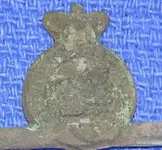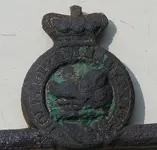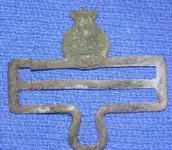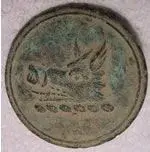The Patriot
Bronze Member
- Joined
- Oct 16, 2009
- Messages
- 2,478
- Reaction score
- 1,964
- Golden Thread
- 2
- Location
- Digging Relics
- 🥇 Banner finds
- 2
- 🏆 Honorable Mentions:
- 1
- Detector(s) used
- Minelab Equinox and CTX 3030
- Primary Interest:
- All Treasure Hunting
I found this item last summer and still yet to get an ID...hope someone here could get more of an ID.... 5th Royal Scots was the closest I could come with a Boers' head.... HONI SOIT QUI MALY PENSE with Boars head and crown.
HONI SOIT QUI MALY PENSE - Its literal translation from Old French is "Shame be to him who thinks evil of it",[3] although it is sometimes re-interpreted as "Evil be to him who evil thinks".[4]
History
This statement supposedly originated when King Edward III was dancing with the Countess of Salisbury. Her garter slipped down to her ankle, causing those around her to respond with s--deleted--s at her humiliation. In an act of chivalry Edward placed the garter around his own leg, saying "Honi soit qui mal y pense", and the phrase later became the motto of the Order.
Translation
It may be understood as 'A scoundrel, who thinks badly by it', or 'Shame on him, who suspects illicit motivation'. Today it is also used to express a slightly ironic sentiment about seemingly, but not explicitly related statements or events. Examples might be a story containing a double entendre, in which the teller 'warns' against the licentious interpretation. It can also be used to point out, by ironically denying, the actual relation of actions. If a politician were to argue the national benefit of a government program - which would happen to bring great investments to a particular county; the county where that politician happens to hail from: Then you'd be 'a scoundrel' to think anything but the 'national benefit' was the true motivation.
The phrase was quoted by Judge Goodwill Banner to Roy Hobbs near the finale of "The Natural."
Heraldic Use
The motto of the Order appears on a representation of the garter, surrounding the shield, on the Royal coat of arms of the United Kingdom, the motto of the Royal arms, Dieu et mon droit, being displayed on a scroll beneath the shield. Several British Army regiments also use the motto of the Order of the Garter, including the Grenadier Guards, Royal Regiment of Fusiliers, Princess of Wales' Royal Regiment, Life Guards and the Blues and Royals. The Canadian Grenadier Guards, The Royal Regiment of Canada, and The Royal Montreal Regiment also use it as their mottos.
Further, the motto is also present on the emblem of the Grenadier Guards, The Times (London), Corps of Royal Engineers, the Royal Australian Engineers, and the Royal Australian Army Ordnance Corps and is denoted on a circular belt, surrounded by a wreath, with the crown jewels atop.
The motto was also used as on the official emblem of the South Australian Railways.
The motto was also used on the official emblem of the Royal Yacht Britannia.
The motto appears on the coat of arms of the British Columbia Supreme Court.
HONI SOIT QUI MALY PENSE - Its literal translation from Old French is "Shame be to him who thinks evil of it",[3] although it is sometimes re-interpreted as "Evil be to him who evil thinks".[4]
History
This statement supposedly originated when King Edward III was dancing with the Countess of Salisbury. Her garter slipped down to her ankle, causing those around her to respond with s--deleted--s at her humiliation. In an act of chivalry Edward placed the garter around his own leg, saying "Honi soit qui mal y pense", and the phrase later became the motto of the Order.
Translation
It may be understood as 'A scoundrel, who thinks badly by it', or 'Shame on him, who suspects illicit motivation'. Today it is also used to express a slightly ironic sentiment about seemingly, but not explicitly related statements or events. Examples might be a story containing a double entendre, in which the teller 'warns' against the licentious interpretation. It can also be used to point out, by ironically denying, the actual relation of actions. If a politician were to argue the national benefit of a government program - which would happen to bring great investments to a particular county; the county where that politician happens to hail from: Then you'd be 'a scoundrel' to think anything but the 'national benefit' was the true motivation.
The phrase was quoted by Judge Goodwill Banner to Roy Hobbs near the finale of "The Natural."
Heraldic Use
The motto of the Order appears on a representation of the garter, surrounding the shield, on the Royal coat of arms of the United Kingdom, the motto of the Royal arms, Dieu et mon droit, being displayed on a scroll beneath the shield. Several British Army regiments also use the motto of the Order of the Garter, including the Grenadier Guards, Royal Regiment of Fusiliers, Princess of Wales' Royal Regiment, Life Guards and the Blues and Royals. The Canadian Grenadier Guards, The Royal Regiment of Canada, and The Royal Montreal Regiment also use it as their mottos.
Further, the motto is also present on the emblem of the Grenadier Guards, The Times (London), Corps of Royal Engineers, the Royal Australian Engineers, and the Royal Australian Army Ordnance Corps and is denoted on a circular belt, surrounded by a wreath, with the crown jewels atop.
The motto was also used as on the official emblem of the South Australian Railways.
The motto was also used on the official emblem of the Royal Yacht Britannia.
The motto appears on the coat of arms of the British Columbia Supreme Court.








